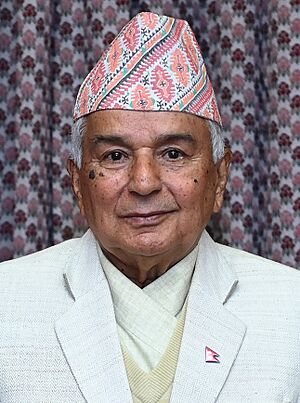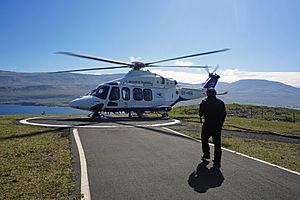President of Nepal facts for kids
Quick facts for kids President of the Federal of Democratic Republic of Nepal |
|
|---|---|
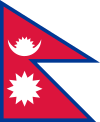
|
|
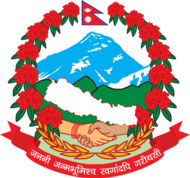
Emblem of Nepal
|
|
| Government of Nepal Nepalese Armed Forces |
|
| Style | The Right Honourable His Excellency |
| Residence | Rastrapati Bhawan |
| Appointer | Indirect election |
| Term length | Five years,
renewable once
|
| Constituting instrument | Constitution of Nepal (2015) |
| Inaugural holder | Ram Baran Yadav |
| Formation | 28 May 2008 |
| Deputy | Vice President of Nepal |
| Salary | रु5015 per day |
| Website | Office of the President of Nepal |
The President of Nepal is the head of state for the country of Nepal. Think of them as the main representative of the nation. The president is also the top leader of the Nepalese Armed Forces. They are considered the "first citizen" of Nepal.
The president is chosen through a special election. This election involves members of Nepal's national parliament and members from the local assemblies in each of Nepal's seven provinces. The office of president was created in May 2008. This happened after Nepal became a republic, meaning it no longer had a king. The current president is Ram Chandra Poudel, who started his term on March 13, 2023.
Contents
How the President's Role Began
Nepal used to be a kingdom ruled by a king. In January 2007, a temporary constitution was put in place. This constitution took away all governing powers from the king. A special group called the Constituent Assembly was elected in 2008. Their big job was to decide if Nepal should keep its monarchy or become a republic.
On May 28, 2008, the Assembly voted to end the monarchy. This was a huge change for Nepal. Ram Baran Yadav was then elected by the Constituent Assembly. He became Nepal's first president, marking the end of 247 years of kings ruling the country.
Choosing the President: The Election Process
Who Can Be President?
To become president of Nepal, a person needs to meet a few requirements:
- They must be eligible to be a member of the national parliament.
- They must be at least 45 years old.
- They must not be disqualified by any law.
- A person cannot be president for more than two terms.
How the Election Works
The president is chosen by an "electoral college." This group includes:
- Members of the national parliament (Federal Parliament).
- Members of the seven Provincial Assemblies.
Each member's vote has a different "weight" or value. This system makes sure that both national and provincial representatives have a say. The person who gets more than half of the total votes from this electoral college becomes president.
If no one gets enough votes in the first round, the two candidates with the most votes go to a second round. The one who gets more than half the votes in this second round wins. If there's still no clear winner, a third round is held. In this final round, the person with the most votes wins.
The election process also tries to make sure that different groups are represented. This means that the president and vice president should come from different genders or communities.
Being President: Term and Removal
How Long Does a President Serve?
A president serves for five years. They can be elected for a second term, but not more than twice in a row. If a president's term ends, they stay in office temporarily. They continue until a new president is elected and officially starts their job.
How a President Can Leave Office
A president stops being president if:
- They send a written letter of resignation to the vice-president.
- The parliament votes to remove them through a process called impeachment.
- Their five-year term ends.
- They pass away.
What Powers Does the President Have?
The president of Nepal has powers that are mostly ceremonial. This means they perform important duties but don't usually make big decisions on their own. The real power to run the government belongs to the Council of Ministers, led by the prime minister of Nepal.
The president's main job is to protect and uphold the Constitution. They act as the guardian of the country's main laws. The president carries out their duties based on the constitution and national laws. They usually do this with the advice and agreement of the Council of Ministers.
Presidential Travel
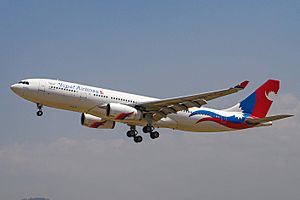
For international trips, the president uses a special plane from Nepal Airlines, an A330-200. For travel within Nepal, they use a VIP helicopter, an AW139 model, operated by the Nepal Army.
Nepal's Journey to a Republic
Nepal was a kingdom for many years, starting in 1768. The king was the head of state. But in 2008, Nepal became a republic. This meant the monarchy was abolished, and the country would now have a president as its head of state.
Ram Baran Yadav became the first president on July 23, 2008. This was a historic moment for Nepal, as it transitioned from a monarchy to a democratic republic.
See also
 In Spanish: Presidente de Nepal para niños
In Spanish: Presidente de Nepal para niños
- Vice President of Nepal
- King of Nepal, the former heads of state of the Kingdom of Nepal
- List of heads of state of Nepal, a full list of Nepal's leaders since 1768
- List of prime ministers of Nepal
 | John T. Biggers |
 | Thomas Blackshear |
 | Mark Bradford |
 | Beverly Buchanan |


